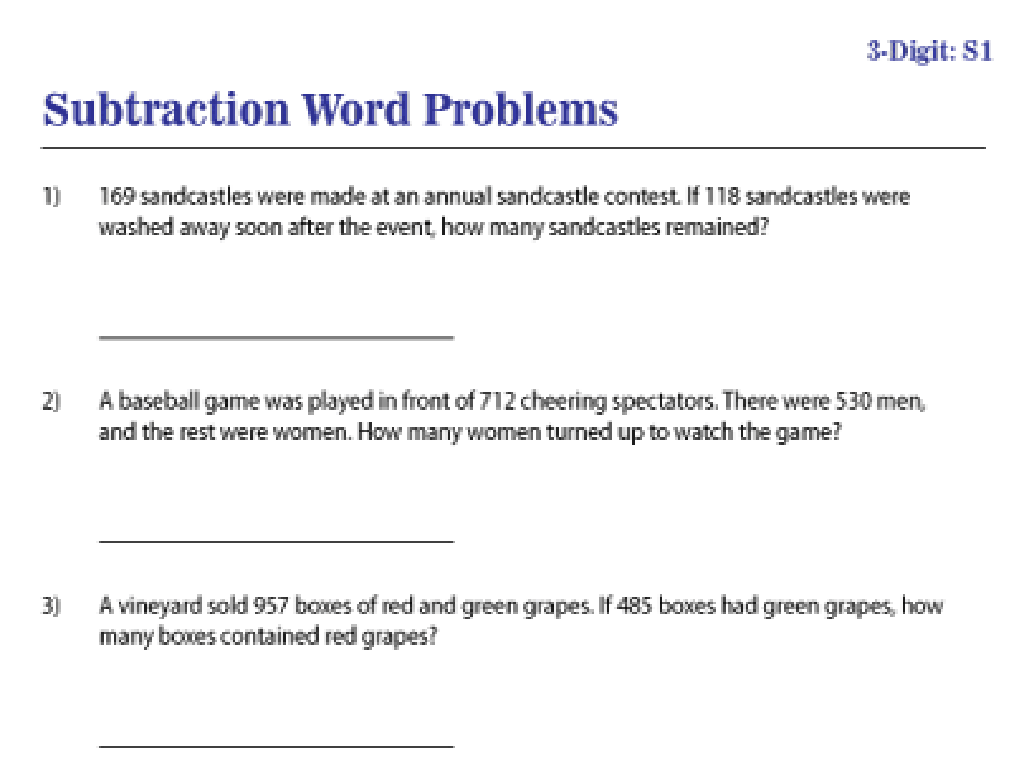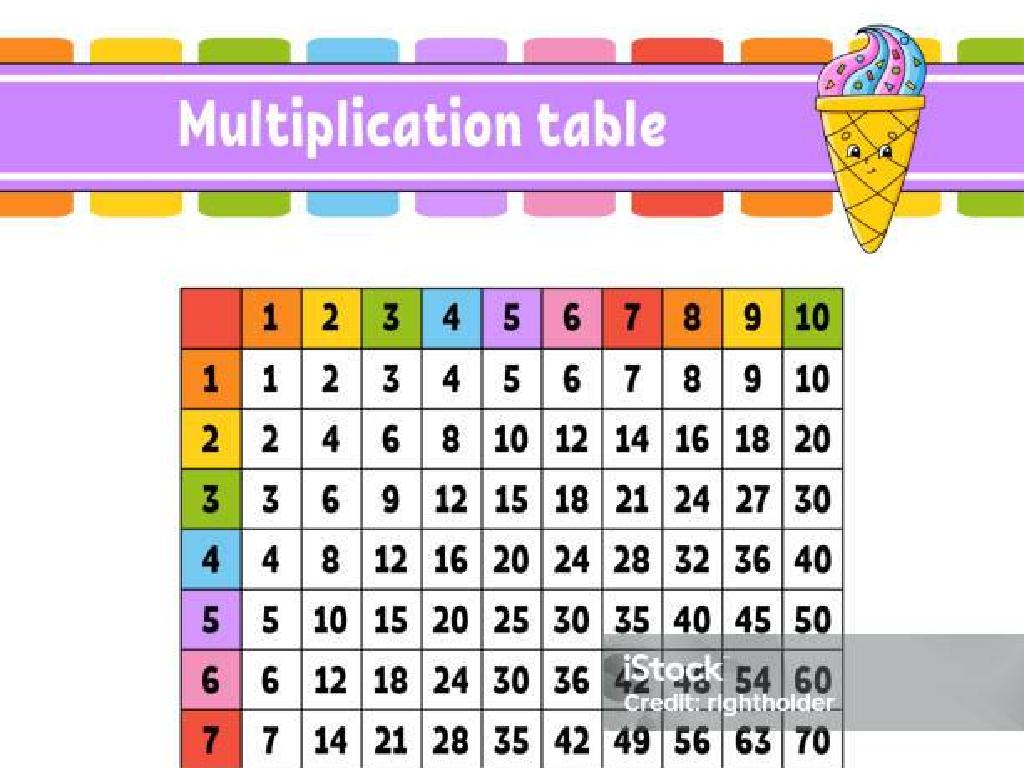Revise The Sentence Using A Stronger Verb
Subject: Language arts
Grade: Third grade
Topic: Descriptive Details
Please LOG IN to download the presentation. Access is available to registered users only.
View More Content
Making Sentences Exciting with Strong Verbs
– What makes stories grab our attention?
– Strong verbs create exciting sentences
– Instead of ‘walk’, say ‘stomp’ or ‘stride’
– Today’s goal: Learn to energize our writing!
– Practice: Revise sentences with vivid verbs
– We’ll take bland sentences and make them fun!
|
This slide introduces the concept of using strong, descriptive verbs to make writing more engaging for the reader. Start by discussing what elements make a story interesting and how verbs play a crucial role in that. Explain that a ‘strong’ verb is specific and vivid; it shows action and emotion effectively. Encourage students to think of alternatives to common verbs that could add more excitement to a sentence. During the lesson, provide examples and engage the class in an activity where they take a simple sentence and revise it using stronger, more descriptive verbs. This will help them understand the impact of word choice on the quality of their writing.
Power Up Your Sentences with Strong Verbs!
– What’s a verb?
– Verbs show action
– Verbs tell us what someone or something does
– Examples: run, jump, think, dream
– ‘Dash’ instead of ‘run’, ‘leap’ instead of ‘jump’
– Use strong verbs to make writing exciting!
– Strong verbs create vivid pictures in the reader’s mind
|
This slide introduces the concept of verbs to third-grade students, emphasizing that verbs are the action words in a sentence. Start by asking students to identify actions they do every day to relate to the idea of verbs. Provide clear examples of simple verbs and then introduce the concept of ‘strong verbs’ – more descriptive verbs that make sentences more interesting and engaging. Encourage students to think of more expressive verbs they could use instead of common ones. For example, ‘stroll’ instead of ‘walk’, or ‘gobble’ instead of ‘eat’. This will help them understand how word choice can paint a clearer picture and make their writing more vivid and enjoyable to read.
Power Up Your Sentences: Weak vs. Strong Verbs
– Weak verbs can be dull
– Strong verbs make sentences pop
– Example: ‘ran’ vs. ‘sprinted’
– ‘The dog ran’ is okay, but ‘The dog sprinted’ paints a clearer picture!
– Practice choosing strong verbs
– We’ll replace weak verbs with strong ones together!
|
This slide introduces the concept of weak and strong verbs to enhance writing. Weak verbs often fail to create a strong image or convey the action effectively, while strong verbs provide clarity and a vivid picture, making sentences more engaging. Use the example provided to show the difference in impact between a common verb ‘ran’ and a more descriptive verb ‘sprinted’. Encourage students to think of other verbs that could replace ‘ran’ to make the sentence more exciting. In the next class, have students practice by revising sentences to replace weak verbs with stronger, more descriptive choices. This exercise will help them understand the power of word choice in writing.
Choosing Stronger Verbs
– Spot the weak verb in a sentence
– Make the action more specific
– Is ‘went’ the best choice or can we use a more exciting verb?
– Practice: ‘She went to the store’
– How about ‘She dashed to the store’ or ‘She strolled to the store’?
– Enhance sentences with vivid verbs
– Using stronger verbs makes writing more lively and interesting.
|
This slide is aimed at helping third graders understand the importance of using strong, specific verbs to make their sentences more descriptive and engaging. Start by explaining how to identify weak verbs and the benefits of replacing them with more vivid ones. Encourage the students to think about the action in the sentence and how to express it in a way that paints a clearer picture. Use the example ‘She went to the store’ to demonstrate how changing ‘went’ to a more descriptive verb like ‘dashed’ or ‘strolled’ can add depth to the writing. In the next class, have students practice this skill by revising sentences with weak verbs and sharing their more descriptive versions.
Making Sentences Exciting with Strong Verbs!
– Revise sentences for impact
– Swap weak verbs for strong ones
– Instead of ‘walk’, how about ‘stroll’, ‘march’, or ‘strut’?
– Partner up for verb brainstorming
– Two heads think of better verbs than one!
– Share your strong verb sentences
– Tell the class your new sentence
|
This slide introduces an interactive class activity focused on enhancing sentence structure by using strong, descriptive verbs. The goal is to teach students how to transform their writing from simple to vivid by choosing more powerful verbs. Start by explaining the difference between weak and strong verbs, providing examples for clarity. Then, pair students up and let them work together to brainstorm stronger verbs to replace the weaker ones in sample sentences. Encourage creativity and the use of a thesaurus. Conclude the activity with a sharing session, allowing pairs to present their revised sentences and discuss the improvements made.
Class Activity: Verb Makeover!
– Revise board sentences with strong verbs
– First sentence as a class example
– Pair up for sentence makeovers
– Work with a buddy to make sentences exciting
– Share your best revisions with the class
– Tell us your new sentences and why you chose the verbs
|
This activity is designed to engage students in understanding the power of strong verbs in making sentences more vivid and interesting. Start by explaining what a strong verb is and how it can improve a sentence. Demonstrate with a sentence on the board, revising it together as a class. Then, have students pair up and give them a few sentences to work on, encouraging them to replace weak verbs with stronger, more descriptive ones. After the activity, ask pairs to share their revised sentences and discuss the impact of the changes. Possible sentences for revision could include: ‘The boy ran to school’ (ran could be changed to ‘raced’ or ‘sprinted’), ‘The dog ate his food’ (ate could be changed to ‘gobbled’ or ‘devoured’), etc. This will help them understand the concept of strong verbs and how they can make their own writing more engaging.
Share Your Sentences Activity
– Pairs share original & revised sentences
– Discuss why revisions are better
– Which verb gives more detail? Why does it sound stronger?
– Class votes on best improvement
– Celebrate descriptive language
– Applaud classmates for their creativity!
|
This slide is for a class activity where students work in pairs to share sentences they’ve revised by using stronger, more descriptive verbs. After sharing, the class will discuss the improvements made in the revised sentences, focusing on the use of more descriptive verbs and how they enhance the sentence. Encourage students to think about the imagery and clarity added by the revised verbs. The activity concludes with a class vote to choose the sentence that shows the most improvement, fostering a sense of community and appreciation for effective writing. Provide examples of strong verbs and guide the discussion to ensure all students understand why certain verbs are more descriptive. Celebrate the efforts of all students to promote a positive learning environment.
Strong Verbs: Conclusion and Homework
– Celebrate your strong verb skills
– Write a short story for homework
– Use your imagination and have fun
– Include at least 5 strong verbs
– Verbs like ‘sprinted’ instead of ‘ran’
– Make your story exciting and clear
|
Today, we’ve learned how strong verbs can spice up our writing, making it more vivid and engaging. For homework, students are tasked with writing a short story that incorporates at least five strong verbs. This will help them practice identifying and using powerful verbs to convey action and emotion effectively. Encourage them to think creatively and to revise their sentences to replace weak verbs with stronger, more descriptive ones. Remind them that strong verbs help the reader to visualize the action and make the story more interesting. Provide examples of strong verbs versus weak verbs to guide them in their writing.






